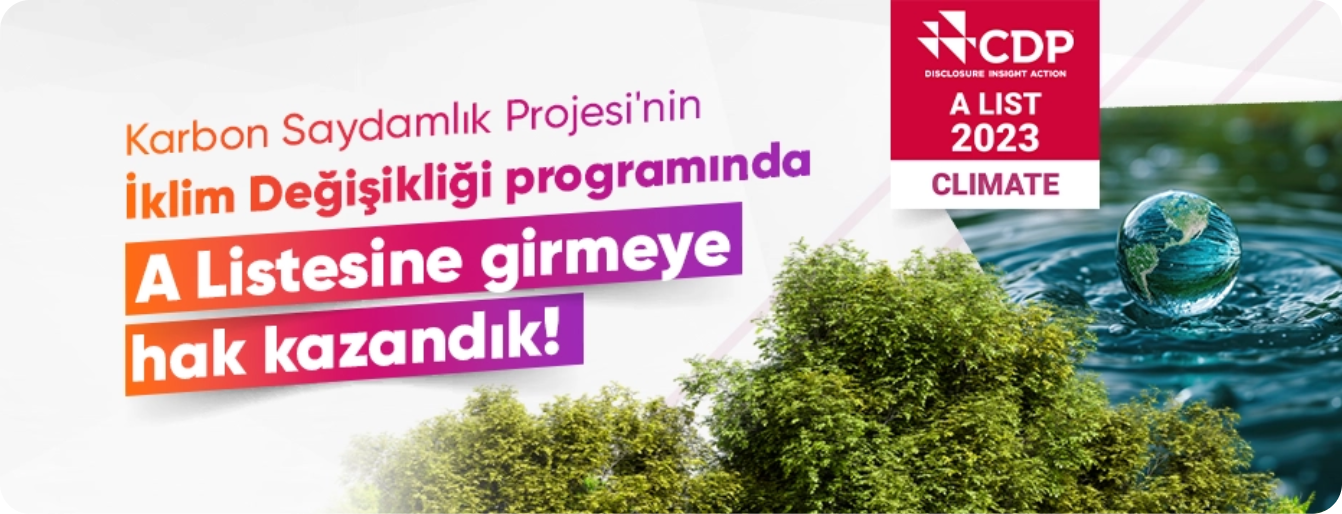The business world must support and respect proclaimed human rights.
Why
Sustainability?

RESPONSIBILITY

PROTECTION


QUALITY

ENERGY RESOURCES
Our Sustainability Reports
As a signatory to the UN Global Compact, we’re proud to build trust for the future!
Aydem Perakende is proud and happy to have become a party to the UN Global Compact - the most comprehensive sustainability platform in the world. As we carry our brand into the future by doing our job to the best of our ability, we fulfill our responsibility to individuals, society, our nation and the environment. To this end, we will never fail to speak out against unethical and unfair practices, always taking into account the impact of our behavior on people's lives, through a transparent and accountable way of doing business that complies with all procedures and regulations. As a signatory, we are committed to complying with the UN Global Compact in all of our business processes in areas such as human rights, labor standards, the environment and corruption, and in addition to complying with these principles, we report on all of the commitments we have made through our annual concrete reports. At Aydem Perakende, we will continue our efforts to make a difference in the industry through our human-oriented approach and sustainable goals. Please follow the link to view our company profile and our letter of commitment to the 10 core universal principles of the UN Global Compact.
Sincerely yours,
10 core universal principles of the UN Global Compact

HUMAN RIGHTS
impacts through their own operations, and should manage any impacts
that do occur, and should work to prevent and mitigate negative impacts
that are directly related to the operations, products and services resulting from business relationships, even if they have not contributed to the occurrence of such impacts. Support for human rights expresses volunteer action in these areas. These actions may include the company's principal business activities, strategic social investments and charitable activities, its engagement in advocacy and public policy, and its partnerships and partnering
activities. However, support for human rights is not a substitute
for respect for human rights. In practice, respect for and support
of human rights are generally linked.
For more information on Principle 1, click here.

HUMAN RIGHTS
For more information on Principle 2, click here.

LABOR STANDARDS
form and participate in organizations of their own choosing on a
voluntary basis. These organizations have the right to freely conduct their activities, including the promotion and advocacy of their professional interests, without interference. Collective bargaining is a voluntary process or activity in which employees and workers discuss all relations, including working conditions. (International Labour Organization, ILO) The UN Global Compact does not require companies to change their current employee-employer relationships and does not take a position on whether or not a national
law is in line with international standards. The International
Organisation of Employers (IOE) has developed the UN Global
Compact Employer's Guide to what labor standards mean
for companies.
For more information on Principle 3, click here.

LABOR STANDARDS
bondage, imprisonment and kidnapping, confinement in the workplace, using the labor and services of prisoners by hiring them by force and without the supervision of public authorities, work that requires punishing freedom of thought and expression, forced overtime work, withholding, renting
documents necessary for work (financial or personal documents such as passport), non-payment of wages and encouraged loans.
For more information on Principle 4, click here.

LABOR STANDARDS
debt bondage, imprisonment and kidnapping, confinement in the
workplace, using the labor and services of prisoners by hiring them by force and without the supervision of public authorities, work that requires punishing freedom of thought and expression, forced overtime work, withholding, renting documents necessary for work (financial or personal documents such as passport), non-payment of wages and encouraged loans. Developed countries Developing countries Light work Age 13 Age 12 Regular work Age 15 Age
14 Hazardous work Age 18 Age 18 Under ILO Convention No. 182, governments must prioritize the elimination of the worst forms
of child labor (slavery, prostitution, pornography, illegal activities, and
other work that may harm the health, safety, or morals
of children).
For more information on Principle 5, click here.

LABOR STANDARDS
opportunities, and occupational health and safety.
For more information on Principle 6, click here.

ENVIRONMENT
Development describes precautionary approach as follows: “Where
there are threats of serious or irreversible damage, lack of full scientific certainty shall not be used as a reason for postponing cost-effective measures to prevent environmental degradation.” In short, where there is a serious or irreversible threat to health and the environment, even if that threat is
not fully understood or detected, action is better than cure. The
business world must support economic measures to protect the
environment and not use scientific uncertainty as an excuse to
postpone action on environmental issues.
For more information on Principle 7, click here.

ENVIRONMENT
self-inspection, guided by appropriate laws, regulations and initiatives
that are integrated into work plans and decision-making processes, and promote transparency and dialogue with employees and the public.” Corporate environmental responsibility is now considered a major issue in the business world. In a world where resources are becoming more limited with each passing day, working with environmental responsibility ensures risk management and supports the long-term sustainability of the company and encourages innovation. All stakeholders, including customers, investors, governments, employees and NGOs, expect companies to minimize
their environmental impacts and, where possible, increase their
positive impacts.
For more information on Principle 8, click here.

ENVIRONMENT
For more information on Principle 9, click here.

FIGHTING CORRUPTION
For more information on Principle 10, click here.
The business world must not be complicit in human rights abuses.
The business world should support workers’ freedom to join a union or to bargain collectively.
Forced and compulsory labor must end.
Child labor must end.
There should be no discrimination in hiring and placement.
The business world must support precautionary approaches to environmental problems.
They must support all activities and organizations that promote environmental responsibility.
They must support the development and diffusion of eco-friendly technologies.
The business world must fight all forms of corruption, including bribery and extortion.
Businesses should support and respect the protection of proclaimed human rights.Businesses should not cause negative impacts on human rights through their own activities or contribute to the cause of such impacts and should handle a potential impact that may arise. Even if the Business did not contribute to the creation of such impacts, it should try to prevent and mitigate the negative impacts that are directly related with the activities or products that are a result of its business relationships, and with services it offers.
Supporting human rights means voluntary actions in this regard. These actions may include the company’s core business activities, strategic social investments and philanthropy, advocacy and public policy engagement, partnerships and collective actions. However, supporting human rights does not replace respecting human rights. In practice, respecting human rights is generally closely related to supporting them.
You can learn more about Principle 1 here.
The second principle is about being implicated in a human rights abuse that another company, government, individual or other group is causing. The risk of complicity in a human rights abuse is particularly high in areas with weak governance and/or where human rights abuse is widespread. However, the risk of complicity exists in every sector and every country.
You can learn more about Principle 2 here.
Freedom of association implies the right of all employees and all workers to freely and voluntarily establish and join groups of their choice. These groups have the right to carry out their activities, including supporting and defending their occupational interests, without any intervention. Collective bargaining is a voluntary process or activity through which employers and workers discuss and negotiate their relations, including the terms and conditions of work. (International Labor Organization, ILO) The UN Global Compact does not make it an obligation for companies to change their current employer-employee relationship structure, and it does not provide any opinion on if a certain national law is in compliance with the international standards. The International Organization of Employers (IOE) developed The Employer’s Guide to the Global Compact to clarify what labor principles mean for businesses.
You can learn more about Principle 3 here.
Forced and compulsory labor includes slavery; bonded labor or debt bondage; physical abduction or kidnapping; physical confinement in the work location; the work or service of prisoners if they are hired to or placed at the disposal of companies involuntarily and without supervision of public authorities; work required to punish the freedom of opinion or expression of views; forced overtime; the lodging, leasing, non-payment of deposits (financial or personal documents) for employment; induced indebtedness.
You can learn more about Principle 4 here.
Forced and compulsory labor includes slavery; bonded labor or debt bondage; physical abduction or kidnapping; physical confinement in the work location; the work or service of prisoners if they are hired to or placed at the disposal of companies involuntarily and without supervision of public authorities; work required to punish the freedom of opinion or expression of views; forced overtime; the lodging, leasing, non-payment of deposits (financial or personal documents) for employment; induced indebtedness.
| Developed Countries | Developing Countries | |
| Light Work | 13 years | 12 years |
| Regular Work | 15 years | 14 years |
| Hazardous Work | 18 years | 18 years |
ILO Convention No. 182 requires Governments to give priority to eliminating the worst forms of child labor (slavery, prostitution, illegal activities, and works that may harm the health, safety or morals of the child) undertaken by children.
You can learn more about Principle 5 here.
Discrimination in respect of employment and occupation means treating people differently or less favorably because of characteristics that are not related to their merit or the inherent requirements of the job, such as race, color, gender, religion, political views, national extraction, social origin, age, disability, HIV/AIDS status, trade union membership, and sexual orientation. Discrimination can arise in a variety of work-related activities such as recruitment, remuneration, hours of work, security of tenure, job assignments, performance assessment and advancement, maternity protection, training and opportunities and occupational safety and health.
You can learn more about Principle 6 here.
Principle 15 of the Rio Declaration on the United Nations Environment and Development defines precautionary approach as follows: “Where there are threats of serious or irreversible damage, lack of full scientific certainty shall not be used as a reason for postponing cost-effective measures to prevent environmental degradation.”
In summary, when there is a serious and irreversible threat for the health and the environment, a precaution is better than a treatment even if such threat is not completely understood or detected. Businesses should support economic measures to protect the environment and should not use scientific uncertainties as an excuse to postpone actions to be taken for environmental problems.
You can learn more about Principle 7 here.
“Businesses and the private sector should increase self-regulation, guided by appropriate codes, charters and initiatives integrated into all elements of business planning and decision-making, and fostering openness and dialogue with employees and the public.”
Corporate environmental responsibility is now seen as a core element of the business world. Acting responsibly for the environment when doing business supports long term sustainability of the business in a world where resources are becoming increasingly limited, in addition to contributing to risk management, and encourages innovation. All shareholders including clients, investors, governments, employees and NGOs expect business to minimize their environmental impacts, and create positive impacts, if possible.
You can learn more about Principle 8 here.
Environmentally friendly technologies protect the environment, are less polluting, use all resources in a more sustainable manner, recycle more of their wastes and products and handle residual wastes in a more acceptable manner than the technologies for which they were substitutes.
You can learn more about Principle 9 here.
The 10th principle commits UN Global Compact participants not only to avoid bribery, extortion and other forms of corruption, but also to develop policies and solid programs to address corruption. The United Nations Anti-Corruption Convention is the legal base to the 10th Principle.
You can learn more about Principle 10 here.


We’re on the A-list of the
CDP Climate Change Program!
Carbon Disclosure Project (CDP)
We’re on the A-list of the CDP Climate Change Program which is the world’s largest environmental reporting platform. The A grade, which certifies the responsibility we have taken, reflects our corporate transparency on climate change, as well as our proactive approach and determination to promote a greener and more sustainable future. We are working to maintain this success through the applications we have developed to reduce the amount of energy we use in our operations and the innovations we have made to use energy more efficiently.



We receive the Silver Award for our Sustainability Report
at the LACP 2023 Vision Awards!
We receive the “Silver Award” for our Sustainability Report at the LACP
(League of American Communications Professionals) 2023 Vision Awards! At the 2023 Vision Awards, organized by the LACP (League of American Communications Professionals) platform for the 23rd time this year, we were awarded the “Silver Award” in the “Energy-Equipment and Services” category with our 2022 Sustainability Report. With this award, we are very pleased that our sustainability efforts are now being recognized on international platforms. With our sustainability vision, we will continue our environmental, social and economic commitments, working with determination and leading the sector in order to leave a more habitable world for future generations. Follow the link to our Sustainability Report.


CDP İklim Değişikliği Programında Bir Kez Daha A Notu Aldık!
Dünyanın en büyük çevre raporlama platformu olan Karbon Saydamlık Projesi’nin (CDP) İklim Değişikliği Programı’nda bir kez daha A Listesi’nde yer aldık.
Bu başarı, iklim değişikliğiyle mücadeledeki kararlılığımızı, sürdürülebilirlik stratejilerimizi ve şeffaflık anlayışımızı bir kez daha gözler önüne seriyor. A notu, yalnızca bir derecelendirme değil, aynı zamanda tüm paydaşlarımıza ve gelecek nesillere daha yeşil bir dünya bırakma amacımıza ulaşmak için attığımız adımların bir göstergesidir.
Sürdürülebilirlik yolculuğumuzda attığımız her adım, bizlere daha güçlü bir gelecek inşa etme fırsatı sunuyor. İklim değişikliğiyle mücadele ve sürdürülebilirlik stratejilerimizi her geçen gün güçlendirerek; daha temiz, daha yeşil bir dünya için çalışmalarımıza devam ediyoruz. Sürdürülebilir bir gelecek için attığımız her adımın uluslararası düzeyde karşılık bulması bizim için önemli bir motivasyon. Bu kararlılıkla çalışmaya devam edeceğiz.


“Duyarlı Ol” (DO!) Programı Kapsamında Gümüş Sertifika ile Ödüllendirildik
Aydem Perakende olarak sürdürülebilirliği yalnızca bir hedef değil, günlük iş yapış biçimimizin ayrılmaz bir parçası olarak görüyoruz. Bu anlayışla çıktığımız yolculuk, bugün somut ve ölçülebilir bir başarıyla taçlandı.
İş Dünyası ve Sürdürülebilir Kalkınma Derneği (SKD) tarafından yürütülen “Duyarlı Ol” (DO!) Programı kapsamında Gümüş Sertifika almaya hak kazandık.
Program sürecinde;
yönetişimden satın almaya, enerjiden suya, atıktan kaynak yönetimine kadar uzanan
5 temel alanda sürdürülebilirlik gerekliliklerini hayata geçirerek,
kurumsal sorumluluğumuzu sistematik ve kalıcı bir yapıya dönüştürdük.
Bugün attığımız her adımın, yarının dünyasını şekillendirdiğinin bilinciyle;
daha yaşanabilir bir gelecek için dönüşümü kararlılıkla sürdürüyoruz.

 Online Services
Online Services Application Inquiry
Application Inquiry Pay Assurance Fee
Pay Assurance Fee Query Installation Number
Query Installation Number Compensation Fee Inquiry
Compensation Fee Inquiry Automatic Payment Order Inquiry
Automatic Payment Order Inquiry Partnership
Partnership
 Hide Menu
Hide Menu